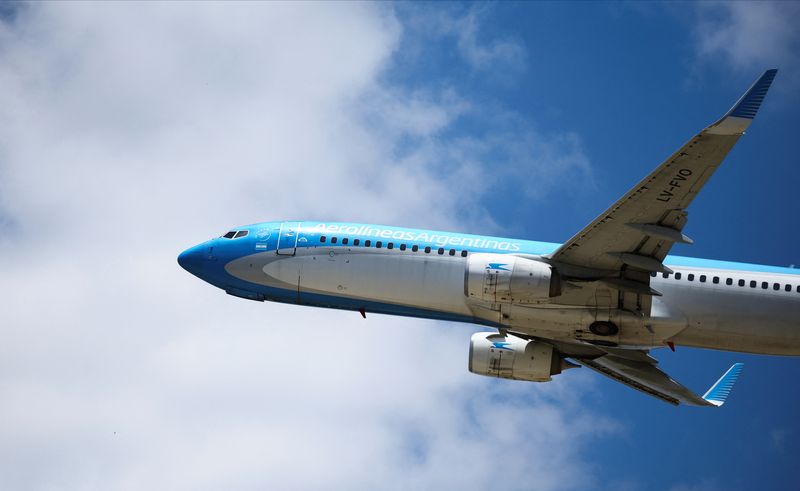By Kylie Madry
BUENOS AIRES (Reuters) – Argentina’s state airline, Aerolineas Argentinas, is slimming down for a potential sale, shedding 13% of its staff, cutting money-losing domestic routes and even removing snacks formerly available to passengers, according to sources and documents seen by Reuters.
The cutbacks, many of whose details were previously unreported, are part of a backdoor attempt to trim the airline’s burden on the state and lure private investment. The drive is progressing, even though libertarian President Javier Milei’s plans to privatize the firm have generated pushback.
The carrier, with Argentina’s blue and white colors, is a major test case of Milei’s pro-market reforms, which are yanking South America’s second-largest economy in a sharply different direction after years of big government. They have improved the state’s finances, but stunted economic growth and pushed up poverty.
Reuters spoke to 10 company executives, officials, pilots, airline workers and union members, and saw a memo on the plans to streamline the airline for sale.
The drive brought in blockbuster operating results for Aerolineas in 2024, a senior company source said ahead of the airline’s release of full-year results next week. Part of that reflects the double-digit reduction in staff targeted in the earlier document seen by Reuters.
“Our job is to get (Aerolineas) in order,” the senior source said, adding that the carrier aimed to operate more like its private counterparts.
“That way, when the time comes and the government enables its sale, the company is more attractive.”
In July, Aerolineas turned a profit for the first time in seven years, data shared with Reuters showed.
Milei, a brash economist, took office in late 2023, pledging to shake up Argentina’s subsidy-heavy economy with “chainsaw” cuts.
He has faced pushback in Congress from privatizing Aerolineas outright, but is determined to push his plans through. His government has threatened to close the airline if it cannot be privatized.
“Either it is shut, to cut the deficit, or it is privatized, but it will not remain in the hands of the government,” Milei told local radio in November.
The administration claims the airline has depleted government coffers by $8 billion since 2008 when it was put back in the hands of the state after a previous privatization in the early 1990s under Milei’s idol, then-President Carlos Menem.
The transport secretariat deferred comment to Aerolineas, which did not respond to requests for comment.
‘LABOR IS OUR ONLY WEAPON’
The process to streamline the company involves cutting loss-making routes, freezing wages, offering buyout programs and shedding contract workers, six airline employees told Reuters. Even a modest food offering for passengers faced the chopping block.
The airline has trimmed its in-flight snack options, saving the firm more than $500,000 a year, the senior airline source said, as the company took a cue from American Airlines (NASDAQ:AAL) which famously cut an olive from each salad served in first class in the 1980s to reduce costs.
Aerolineas now offers just one dessert in executive class and has cut a cereal bar for economy passengers, the senior company source added.
Unions and Milei’s political opponents have fought back, with protests at major airports wreaking havoc on air travel in recent months, causing flight cancellations and delays. In December, Buenos Aires province’s opposition governor said he would oppose any attempt at privatization.
“Our labor is the only weapon we have,” said veteran Aerolineas pilot Juan Pablo Mazzieri, who sports a tattoo of the airline’s logo, an Andean condor, on his shoulder. “We don’t like doing it, but we’re going to cause delays and cancellations.”
Milei argues that the carrier needs to become more competitive. His administration looked to deregulate the sector, allowing low-cost carriers to ramp up operations and push an “open skies” policy to allow foreign competitors to enter the market.
COURTING SUITORS
Milei has advocated selling off Aerolineas in one go. Indeed, the firm’s CEO, Fabian Lombardo, told local radio that several international airlines had expressed interest. So far those talks have remained informal, sources said.
The only contender to publicly declare interest is holding company Abra Group, which controls Colombia’s Avianca and Brazil’s Gol.
Abra is still conducting due diligence, and it remains unclear what an acquisition of Aerolineas would look like, Abra’s chief commercial officer, Joe Mohan, told an industry conference in Dallas in November.
Aerolineas could be a tough sell, analysts cautioned.
“It would be easier for someone to join with a percentage (stake),” the Aerolineas senior source said, citing the plans of German airline Lufthansa to acquire a 41% stake in Italian state carrier ITA.
Still, Aerolineas has yet to bring banks and advisers on board, according to the source, because it needs more clarity on the government’s plan.
Milei’s “Plan B” could be selling the airline to its employees, ridding him of both the firm’s financial headache and its workers, whom he considers combative. Aerolineas says the labor disputes have cost the carrier millions of dollars.
The company has cancelled employee perks, such as payment for commuting time, free flights, dollar-based bonuses and extra holidays – which were all coming “at the expense of poor Argentines,” according to the government.
Several union leaders, however, say workers taking over the firm was a non-starter.
The unions argue Aerolineas serves a social purpose beyond its balance sheet, in a country that is five times the size of France and which stretches from the Antarctic to tropical jungle in the north. Its cities are far-flung and transport links are limited.

Since the beginning of the cuts, which included a government subsidy on plane tickets, domestic travel in Argentina has fallen 9%, data shows.
“We’re seeing nearly half the number of flights we did a year ago,” said Marcelo Austi, an Aerolineas gate agent at Buenos Aires’ local Aeroparque airport. “That’s an enormous difference.”


